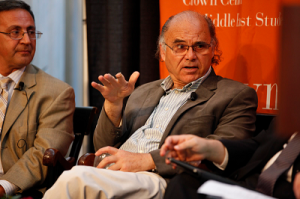Kanan Makiya is a professor of Islamic and Middle Eastern Studies at Brandeis University who was an early and vocal proponent of the 2003 Iraq War. In fact, he was in the Oval Office with George W. Bush when both received news that Baghdad had fallen to American forces. No doubt the two congratulated each other at the time.
Then came the aftermath, as this New York Times article relates:
For years afterward, as Iraq fell apart, Mr. Makiya’s pen went silent while he struggled to make sense of what happened and his own role in the catastrophe.
As a Middle East scholar at Brandeis University, Mr. Makiya is a man of facts and history. Ultimately, though, he decided the best way to express what he felt became of Iraq was to write fiction. Only with a novel, he says, could he access “the larger meanings and deeper truths about what went wrong post-2003.”
The book is also an apology, and represents a decade of introspection for a man whose life’s work was closely associated with a costly war that was justified by the false assertion that Mr. Hussein had weapons of mass destruction and was a threat to the United States.
That says a lot about the act of writing, doesn’t it? Dr. Mikaya could have written a scholarly account explaining what went wrong in the war he advocated. But that just wasn’t enough. Mikaya had to redo the Iraq War. He had to creatively re-arrange the facts — to play with them. Fiction writing is a type of play, which development psychologists now recognize as a vital part of learning. And play isn’t just for kids — creative exploration of the world around us is both therapy and mental exercise that adults need as well.
There’s a redemptive aspect to fiction writing, also, which I believe Dr. Mikaya would acknowledge. It’s a means of making right those things from our past that still gnaw at us.
[SPOILER ALERT!]
In the novel and movie Atonement, Ian McEwan explored that aspect of writing. It’s the tale of Briony Tallis, a young girl who spitefully and wrongfully accuses her sister’s suitor of rape. That, of course, ends the wedding plans and ruins the life of both the sister, Cecilia, and her suitor, Robbie.
At the end of the story, Cecilia and Robbie are happily reunited. Then comes this admission from an elderly Briony, now a writer:
My sister and Robbie were never able to have the time together they both so longed for, and deserved. And which, ever since, I’ve… Ever since I’ve always felt I prevented. But what sense of hope, or satisfaction, could a reader derive from an ending like that? So, in the book, I wanted to give Robbie and Cecilia what they lost out on in life. I’d like to think this isn’t weakness or evasion, but a final act of kindness. I gave them their happiness.
I think Flannery O’Connor was right when she said, “There is something in us, as storytellers and as listeners to stories, that demands the redemptive act, that demands that what falls at least be offered the chance to be restored.” Atonement, whose meaning includes both paying what’s owed and seeking forgiveness, is at the heart of writing.

I think you nailed it. Mikaya should have done a wtf went wrong non-fic instead of an exercise in self-redemption. But such is life, the guilth have to find an outlet.
LikeLiked by 1 person
LionAroundWriting,
Sometimes fiction is the only way we can face the truth.
LikeLiked by 1 person
True enough.
LikeLike
Reblogged this on chithankalai.
LikeLike
“Atonement, whose meaning includes both paying what’s owed and seeking forgiveness, is at the heart of writing.” Love that.
LikeLike